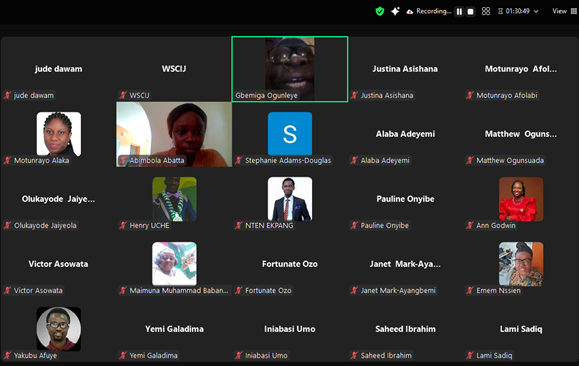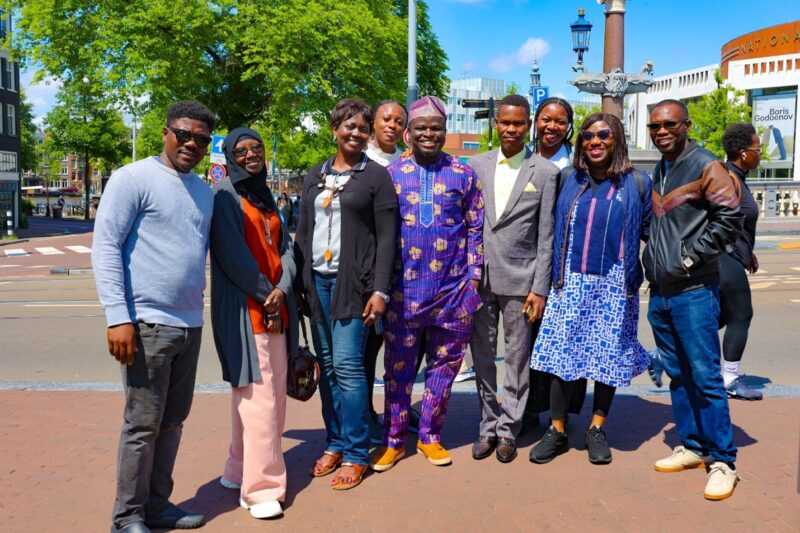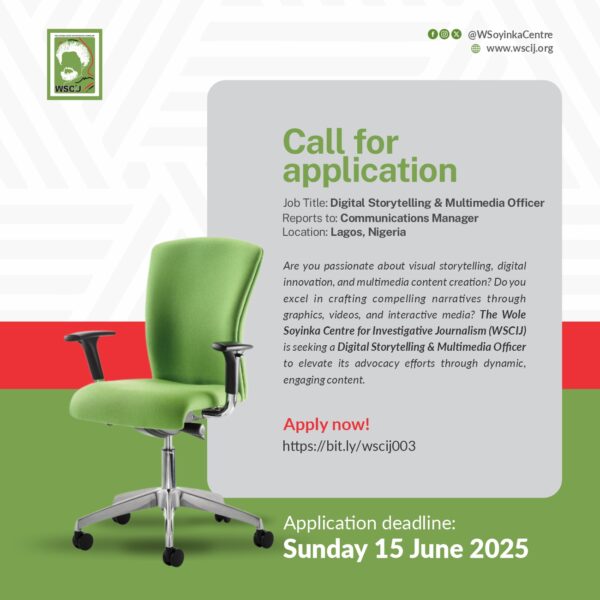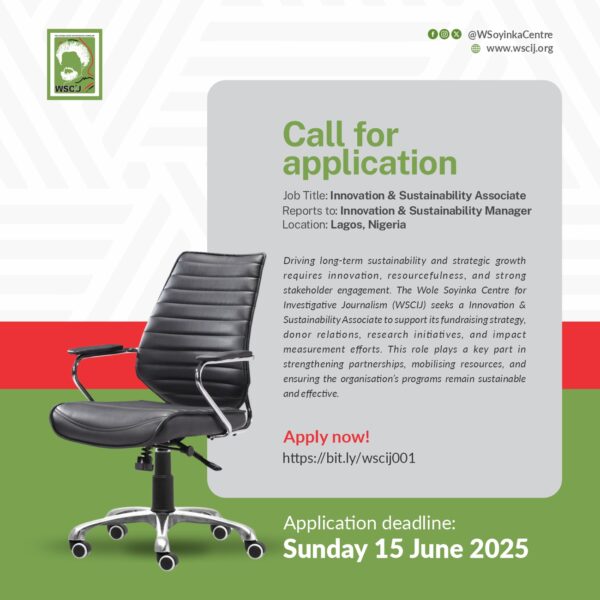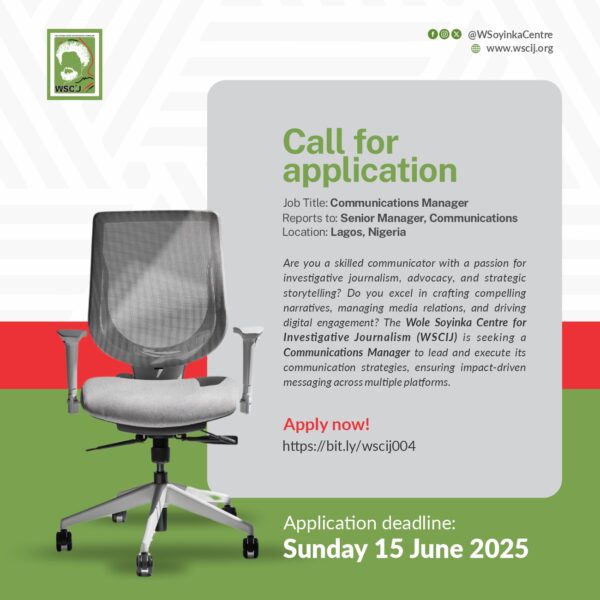Enhancing mental health advocacy, implementation of organisational reforms that support journalists’ well-being, and establishment of therapy and risk assessment desks to safeguard the mental health of journalists was the centre of discussion at the Wole Soyinka Centre for Investigative Journalism (WSCIJ) mental health conversation. The panel session themed- ‘Doing 2025 Differently: Self-care and Work-Life Balance for Investigative Journalists’ featured Gbemiga Ogunleye, Former Provost Nigerian Institute of Journalism; Justina Asishana, Niger State Correspondent, The Nation Newspaper and Mojisola Raufu, Lead clinical psychologist, Olive Prime Premium Psychological Service with Jude Dawam, the Head of Station, Hot FM Lagos, as moderator.
The event also featured the launch of the second phase of the mental health and psychosocial support for journalists as part of the Civic Space Guard project which is supported by the Embassy of the kingdom of Netherlands in Nigeria. This initiative offers investigative journalists and editors free therapy and counselling services.
While declaring the session open, Motunrayo Alaka, ED/CEO, WSCIJ, who highlighted the often-overlooked toll the profession takes on its practitioners, emphasised the need for intentional conversations and a deeper focus on the mental well-being of journalists.
Alaka described journalism as “almost a thankless job,” noting that while societal impacts like better schools or improved healthcare infrastructure are tangible results of journalistic efforts, the personal costs faced by journalists often go unacknowledged. She stressed the importance of addressing the mental strain that journalists endure, so that the profession does not break its practitioners. She urged attendees to take the conversation into their newsrooms, advocate for a shift towards prioritising mental health resources and supportive practices.
On her part, Justina Ashishana, Niger correspondent for The Nation newspaper, shared her personal experience, constant pressure to meet deadlines and the strain of facing lawsuits from individuals aggrieved by published reports. She also spoke about the emotional toll of repeatedly hearing painful accounts from victims. She advised colleagues to prepare themselves mentally before heading out on assignment, take time to relax and recharge, and set clear boundaries between work and personal life to avoid burnout. Ashishana also stressed the value of seeking support from trusted colleagues, friends, and mentors. She encouraged journalists to be open about the challenges they face and to prioritise self-care.
Gbemiga Ogunleye, former editor of The Punch and Director of News at TVC, criticised the outdated mindset that long working hours or late nights in the office are necessary to demonstrate commitment to journalism. He argued that this approach contributes to an unhealthy work culture that worsens stress among journalists. Ogunleye added that being on the frontline and covering significant events is demanding enough, and journalists should not have to sacrifice their health to prove their dedication to their work. He called on news organisations to adopt policies that promote mental health awareness within their newsrooms. According to Ogunleye, such policies would be an important step in addressing the mental health challenges faced by journalists, helping to create a healthier, more sustainable working environment for those in the profession.
Mojisola Raufu, Lead Clinical Psychologist at Olive Prime Premium Psychological Services, outlined symptoms such as increased aggression, social isolation, absenteeism, sleep disturbances, weight fluctuations, and feelings of hopelessness, as signs of deteriorating mental health. Raufu emphasised that when journalists experience these symptoms, they must speak up and seek professional help, particularly if they begin to experience more severe signs such as hallucinations or emotional numbness. She explained that untreated trauma could escalate into more significant mental health issues if not addressed promptly.
She also highlighted the issue of hypervigilance, where journalists become excessively cautious or develop mistrust of others. She said such behaviours can lead to a lack of trust in colleagues or sources, affect the journalist’s ability to work effectively and impact their overall well-being.
The psychologist then recommended taking regular breaks, engaging in activities outside of work, and maintaining a personal routine to mitigate the stress associated with the demanding nature of journalism. She also suggested periodic stress risk assessments and regular health check-ups to ensure both mental and physical well-being are monitored and maintained. These measures, she said, are essential to preventing burnout and the physical health problems that can often contribute to mental health challenges.
Lending his voice to the conversation, Lekan Otufodunrin, Executive Director of the Media Career Development Network, advised journalists to approach their careers with more foresight. He emphasised that no story or job should come at the expense of one’s life, and that it is vital for journalists to recognise when to move on and seek out opportunities that align with their personal and professional goals. He expressed disbelief at the ongoing culture where journalists take pride in working late or sleeping in the office, pointing to the lessons learned during the COVID-19 lockdown, which proved that remote work is not only possible but practical in the media industry. While raising concerns about the insecurity of jobs in the Nigerian media sector, where journalists can be swiftly replaced if anything happens to them, Otufodunrin encouraged media professionals to develop adaptable skills in line with technological advancements to safeguard their future in the industry.
Others who spoke include Juliana Francis, Deputy Editor, The Eagle Online, who emphasised that a journalist’s impact may be limited by the reach of their organisation, advising them to stay committed to producing quality work despite limited visibility, Omotayo Akinola, On-Air-Personality, Spectrum Broadcasting Corporation stressed the need to balance work with self-care, reminding journalists to build their own portfolios alongside their organisational contributions, while Stephanie Adam-Douglas, Deputy Manager of Media Freedom at the Centre for Journalism, Innovation, and Development (CJID) called for media organisations to prioritise mental health as part of their core policies, ensuring support for journalists before, during, and after assignments.

